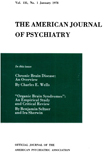The Dream-Protein Hypothesis
Abstract
Recent studies of learning and memory indicate that new experience is encoded by means of protein synthesis in brain tissue. The author reviews the literature on diet, nutrition, dreams, and REM sleep and finds support for the hypothesis that dreaming is a process of psychophysiological growth that involves the synthesis or modification of protein structures in the brain and that serves as the organic basis for new developments in the personality. The author outlines a series of experiments to further test the validity of this hypothesis. The implications of this research for a "growth" or "psychosynthetic" orientation in psychotherapy are discussed.
Access content
To read the fulltext, please use one of the options below to sign in or purchase access.- Personal login
- Institutional Login
- Sign in via OpenAthens
- Register for access
-
Please login/register if you wish to pair your device and check access availability.
Not a subscriber?
PsychiatryOnline subscription options offer access to the DSM-5 library, books, journals, CME, and patient resources. This all-in-one virtual library provides psychiatrists and mental health professionals with key resources for diagnosis, treatment, research, and professional development.
Need more help? PsychiatryOnline Customer Service may be reached by emailing [email protected] or by calling 800-368-5777 (in the U.S.) or 703-907-7322 (outside the U.S.).



